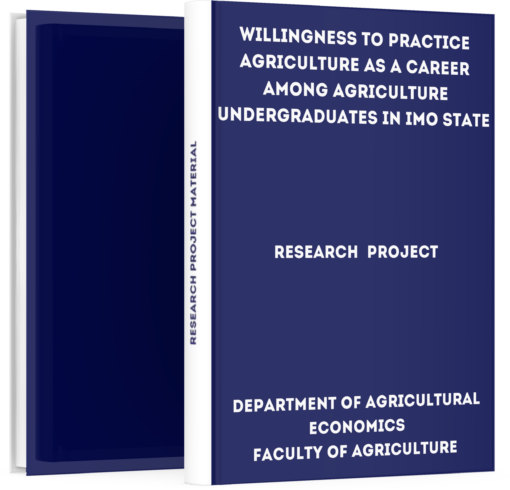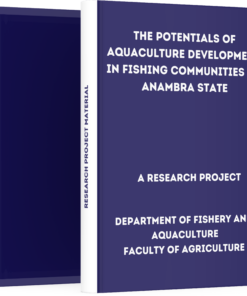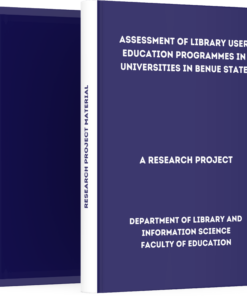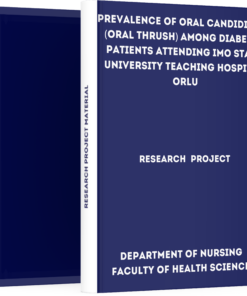Willingness to Practice Agriculture as a Career Among Agriculture Undergraduates in Imo State (PDF)
₦3,000.00
If you are interested in getting this project material “Willingness to Practice Agriculture as a Career Among Agriculture Undergraduates in Imo State”, click on the DOWNLOAD BUTTON to make payment and the file will be delivered to your email immediately after confirmation.
Description
– Willingness to Practice Agriculture as a Career Among Agriculture Undergraduates in Imo State –
Download Willingness to Practice Agriculture as a Career Among Agriculture Undergraduates in Imo State. Students who are writing their projects can get this material to aid their research work.
Abstract
This study examined the willingness to practice agriculture as a career among agriculture undergraduates in Imo state by randomly sampling 100 undergraduate from three agriculture institutions in Imo state with the aid of a structured questionnaire. Data collected were subjected to descriptive statistics.
Results revealed that a higher proportion of the undergraduate was male (52%) Christians (70%) and had parents who are more of civil servants. The majority (60%) were willing to go into agriculture-related enterprises with livestock production (30%) been the most preferred enterprise.
Major reasons for student’s willingness were identified to include a desire to be self-employed, lucrative nature of agriculture, and encouragement received during training.
Lack of credit load facilities to Agriculture graduates and unavailability of infrastructural facilities such as storage, processing, and marketing accesses were major reasons hindering undergraduates’ willingness to venture into Agriculture related enterprises.
This study concluded that Nigerian agriculture can still contribute significantly to the Nation’s Gross Domestic Product.
For sustainable development to take place, this study recommended that affordable credit loan facilities should be made available to agriculture graduates as this will sustain their willingness to go into agriculture-related enterprises.
Introduction
1.1 Background of the Study
Agriculture was of great importance to Nigeria’s economy in the 1960s (Omorogiuwa, Zivkovic, and Ademoh, 2014). During this period, Nigeria was noted among world economies for exportation of crops such as shelled groundnuts, cocoa, palm oil, cotton, etc.
Aside from revenue generation from the exportation of cash crops, an average Nigerian looked well-fed (Edoka, Otajele, and Adejo, 2011) because food production was also at a sufficient level despite the use of the traditional means (hoes and cutlasses) by the local producers of these crops.
In buttressing the above point, Adesina (2012) noted that Nigeria accounted for 42% of the world’s total export of shelled groundnuts with a total export volume of 502,000 metric tonnes (MT) in 1961.
According to him, with 167,000MT which accounts for 27% of the world’s export of palm oil, Nigeria was the largest producer of palm oil in 1961.
In the discussion of the glory of Nigerian agriculture in the 1960s, cocoa farmers were noted for wealth in the early years of independence as Nigeria accounted for 18% of the global export volume for cocoa in 1961 (Adesina, 2012).
This enviable position of Nigerian agriculture was lost due to neglect of the sector as soon as the discovery of oil in the country. Now, Nigeria cannot boast of exporting significant quantities of these crops.
In fact, local food production is not sufficient to feed her teeming population. In 2008, Nigeria could not import shelled groundnut due to the incidence of aflatoxin which the country could not fix (Adesina, 2012).
With respect to palm oil, Nigeria’s export declined to 25,000MT in 2008 leaving Nigeria far behind Malaysia that took oil palm seedling from Nigeria to her country while Nigeria’s share of the global market for export of cocoa dropped to 8% also by 2008.
Aside from Nigeria’s lost glory in the exportation of cash crops, local production of food crops could no longer meet up with the food demand of Nigerians and hence importation seems to be the adopted alternative to ensure that citizen’s right to food is not infringed upon
How to Download this Project Material
First, note that we are one of the best and most reliable online platforms because we don’t retain any of your personal information or data as regards making payments online.
PRICE: ₦3,500 ₦3,000 (Three Thousand Naira Only)
Make a bank deposit or mobile transfer of ₦2,000 only to the account given below;
Bank Name: UBA Account Number: 1022564031 Account Name: TMLT PRO SERVICES
After making the payment, CLICK HERE to send the following on WhatsApp;
- Depositor’s Name or Screenshot of Payment
- Name of the Past Question
- Active Email Address
or Call Us On +2348082284439 Once your details have been received and your payment confirmed by us, you will receive the past question in your email or WhatsApp within 5 Minutes.
Guarantee of Getting the Material
We understand that due to the high rate of fraud, many people are afraid of making purchases online but be rest assured that PastExamQuestions will deliver your material after payment.
Once your details have been received and your payment confirmed by us, you will receive the past question in your email or WhatsApp.
Give us Feedback
Have we been able to satisfy you? How well do you think the material will be helpful after having gone through it? Does the price worth the material?
Let’s hear from you! We recommend that our customers give feedback at the end of every transaction to enable us to serve better. You can do this by clicking the review button on this page.
Where is the review button? >> Just scroll up to where you see reviews





Reviews
There are no reviews yet.